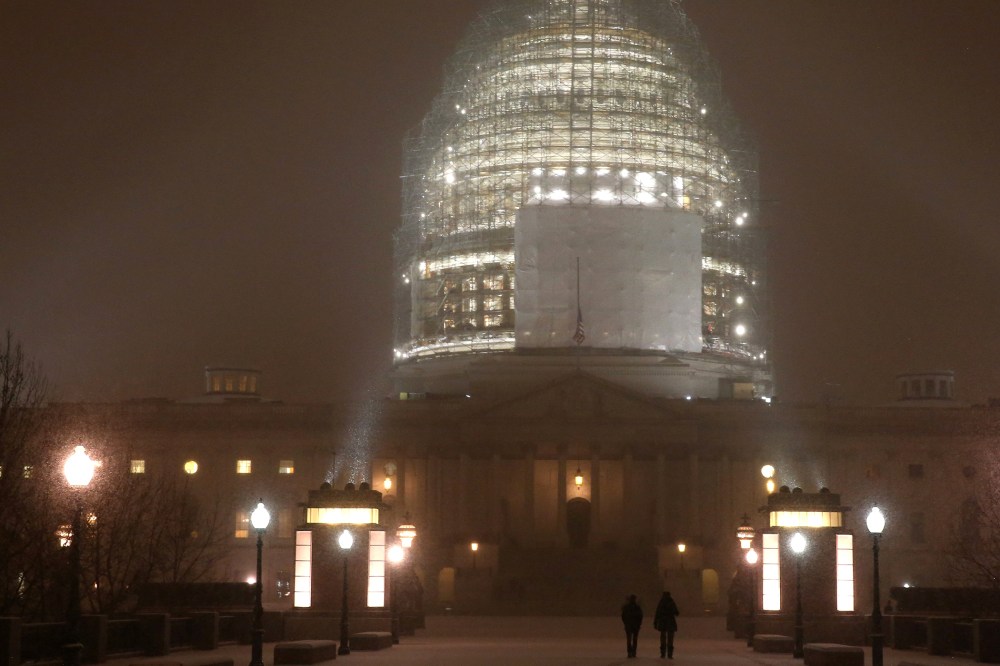Republicans officially take control of both sides of Capitol Hill on Tuesday for the first time since 2006. And despite promises by House and Senate GOP leaders to find areas of bipartisan agreement, the fully Republican-led Congress will still pose a major hurdle for President Obama and his party.
Republicans have already signaled they plan to take the legs out from under several of Obama’s accomplishments and executive orders. But since there’s plenty of division within GOP ranks, will they be able to effectively govern and pass legislation of their own?
Overshadowing Republicans’ legislative agenda, at least initially, will be the continued fallout of Rep. Steve Scalise of Louisiana, who recently apologized for delivering a 2002 speech to a white-supremacist group led by former Ku Klux Klan leader David Duke. And Rep. John Boehner will have to defend his speakership from a handful of tea party conservatives determined to see one of their own lead the fractious conference.
The president has said he may be able to work with Republicans on issues like revamping the tax code, free trade and infrastructure spending. But conservatives will also likely encounter President Obama’s veto pen, something the commander-in-chief has only used twice during his time in office, largely thanks to the previous, Democratic-controlled Senate.
With Republicans slated to control 247 of the 435 seats in the House of Representatives and 54 of the 100 seats in the Senate, here’s a look at some of the hottest issues the 114th Congress is likely to tackle.
1. Rep. Steve Scalise. Republican leaders including Boehner and House Majority Leader Kevin McCarthy have come to the defense of Scalise, the third ranking member of the House majority. Scalise has insisted he did not realize he was speaking to a hate group at the time and has since apologized.
Whether that support sticks – and if he can keep his No. 3 job in the House GOP leadership — remains to be seen.
Democrats are criticizing House GOPers’ decision to stand by the lawmaker, with Democratic National Committee chair Debbie Wasserman Schultz saying in a statement on Monday that “as the new Congress begins, nothing discredits Republican claims of ‘outreach’ and bringing people together more than their decision to keep Steve Scalise at the top tier of the elected leadership of their caucus.” White House Press Secretary Josh Earnest said on Monday that allowing Scalise to keep his job says something about GOP “priorities and values” but did not go as far as to call on the lawmaker to step down.
RELATED: GOP leaders defend Scalise’s leadership position as majority whip
2. The Keystone XL pipeline. Incoming Senate Majority Leader Mitch McConnell has promised that the first measure the Senate will take up in January will be the controversial Keystone XL pipeline. Proponents of Keystone — mainly GOPers, labor unions, and oil companies– have trumpeted the project, which would create an oil transport system from Canada to the Gulf of Mexico. They argue the plan would generate thousands of jobs and make the country less dependent on oil from the Middle East.
Critics, including many Democrats, argue the 1,179-mile project would release dangerous greenhouse gas emissions, would have no effect on U.S. gas prices and would not bring in significant numbers of new jobs. Obama has suggested in the past that he might veto the legislation, even if both houses of Congress approve it. Meanwhile, the State Department has been reviewing the project for years.
RELATED: McConnell has a confrontational course in mind
3. Health care. In the latest GOP weekly address, Rep. Rodney Davis of Illinois said the House would target Obamacare – specifically language that defines a full-time employee as someone working a minimum of 30 hours per week. In a new bill, those hours would be bumped to 40 hours per week. Under Obama’s health care plan, any businesses with more than 50 full-time employees must provide health coverage for those workers. In the last Congress, Democrats opposed similar legislation.
In addition, Davis said the House will consider legislation called the “Hire More Heroes Act,” which would exempt post 9/11 veterans who already receive government health care from being counted as part of the 50 full-time employees. Davis said the act will provide veterans a “better chance in a still-tough job market.” For his part, President Obama has yet to weighed.
After the GOP won control of Congress, McConnell said repealing the medical-device tax (which helps fund Obamacare) would also be a priority. There is currently a 2.3% tax on the medical-device industry on products it sells in the United States, including dentures, pacemakers and MRI machines. Obama hasn’t ruled out repealing the tax.
RELATED: Obamacare, Keystone XL top GOP 2015 agenda
4. Immigration. Expect a challenge to Obama’s immigration legislation. The president drew the ire of conservatives in November after announcing an executive action to temporarily shield as many as 5 million undocumented immigrants from deportation.











